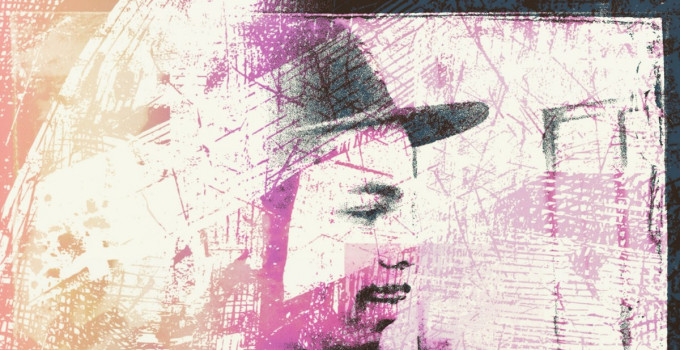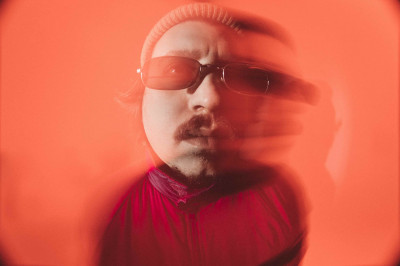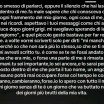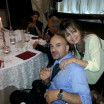
Nightguide incontra il B-boy Stripes Love per la tappa barese del RedBull BCOne
-
28/03/2015 | luigirizzo
- 4991
Qualche giorno fa eravamo a Mesagne, presso la scuola Danza in Disordine, per assistere al workshop di breakdance tenuto da Stripes, giovane b-boy americano che in serata sarebbe stato giudice della City Cypher pugliese, la battle che permetterà ad alcune promesse nostrane di accedere alle finali mondiali di Red Bull BCOne, il 23 maggio a Roma.
Lo abbiamo osservato parlare, insegnare e muoversi. Creare empatica con un gruppo di ragazzi desiderosi di imparare ma così diversi dalla formazione "di strada" USA da cui Stripes proviene.
E quella che aveva tutti i presupposti per essere "solo" una lezione di breakdance si è trasformata in una lezione di vita.
NG: Ho sentito qualcosa riguardo le tue origini: hai 27 anni e vieni da Miami
In realtà sono nato in Germania, ma la mia famiglia era nell'esercito quindi non sono tedesco. Poi mi sono trasferito a Jacksonville ma ho viaggiato molto, la mia crew però è di Miami.
NG: Quindi come sei arrivato alla breakdance?
Ho iniziato nel 2002 e la ragione per cui è iniziato tutto è perché un ragazzo del mio quartiere più grande di me, che ammiravo molto, aveva un video e ce lo ha mostrato. A quel tempo era molto insistente ma non era troppo serio. Non la prendeva molto sul serio e visto che volevo essere come lui...sai quando sei più piccolo...non la prendevo seriamente neanche io. Se lui lo faceva, io lo facevo.
Ma mi ricorderò sempre quando l'ho visto per la prima volta. Più avanti mi sono trasferito in una parte diversa della città, non avevo amici né niente del genere, e uno di questi video che mi aveva fatto vedere, chiamato 'beat street', venne mandato in onda in tv e mi fece ritornare questa passione. Ma in quel momento non avevo amici quindi quel mondo mi limitavo a guardarlo, e a farlo solo mio.
NG: Ti sei sentito parte di questo mondo quindi?
Si esattamente, specialmente il fatto che ero solo e, sai, quando si è piccoli l'immaginazione è incontrollabile, quasi migliore. Beh, il primo giorno di liceo, dopo aver visto video di break da solo per tutta l'estate, avevo questa idea della scuola come fosse 'beat street', pensavo fosse ancora come negli anni '80.
NG: Quindi, il motivo per cui durante la tua lezione hai insistito molto sul concetto di “non sforzarti di fare le cose” è perché hai fatto tanti sacrifici nella vita.
Beh in un certo senso, ma non direi che mi sono sforzato troppo, se non nella norma come tutti gli altri. Ma se c'è una cosa che ho capito dalla danza è che ho appreso cose dalla break che mi hanno aiutato in altro: come, per esempio, non sono mai stato super dotato fisicamente e in termini della 'breaking' non ero super flessibile, ma a volte invece che forzare sè stessi nell'imparare qualcosa bisogna solamente trovare un altro modo di farlo.
Non direi, poi, che ho avuto una vita straordinariamente difficile, ma c'erano delle volte in cui cose imparate dalla danza mi hanno aiutato nella vita e viceversa. Ho scoperto che a volte devi soltanto trovare un altro modo perché diventi più semplice, invece che perdere tutte le tue energie e risorse per qualcosa che probabilmente non fa per te. Capisci quello che intendo. Stavo insegnando a me stesso come fare break all'inizio, qualcosa che sembra così fisicamente complicato. Poi ho iniziato a comprendere che non era solo quello, ma si trattava di catturare quel sentimento...che era la musica e l'emozione dietro di essa.
NG: Ti ricordi il momento preciso in cui hai capito che la vita non era solamente sacrificio? Ovviamente anche per la danza.
Veramente è divertente, perché dal minuto in cui credo di sapere qualcosa, non posso davvero dire di aver afferrato il concetto. Perché alla fine chi ha ma raggiunto il punto in cui sai tutto? So che il sacrificio non aiuta necessariamente a forzare le cose ma non c'è stato un momento in cui ho capito che non ne stavo compiendo.
NG: La mia teoria è che cambiare è un processo lungo ma c'è sempre un momento preciso in cui cambi.
Esattamene, direi che c'è un momento di comprensione...ma arrivi ad un punto in cui realizzi che non è tutto in funzione di quello, tipo 'No, non funzionerà mai'. Ora ne sono consapevole, ma poi arriva un momento in cui tutta la tua vita cambia e pensi di stare maturando ma ecco arriva una nuova sfida, è così per tutti. Capisci cosa voglio dire?
NG: Si, perfettamente.
E quando incontri di nuovo quegli ostacoli vorresti tornare indietro alla vecchia mentalità, ma devi tenere a mente questa lezione ancora una volta. Ballare, come tutte le arti, è una forma di espressione e ha a che fare con il tuo modo di vivere. Puoi trasmettere soltanto ciò che hai già dentro di te, come quando spremi una bottiglia di ketchup e il ketchup viene fuori. Qualunque cosa affronti nella vita, qualsiasi cosa impari, è un dare e avere.
NG: Mentre ti guardavo attraverso la mia macchina fotografica, che è un po' come la 'mia breakdance', ho visto un uomo che si dedicava molto a questi ragazzi anche se non li conosceva; e prestavi molta attenzione a quello che gli dicevi. Hai avuto dei buoni insegnanti così attenti e impegnati come lo sei tu?
Beh non particolarmente perché per la maggior parte in America, specialmente dove vivo io, non abbiamo nessuna scuola di danza dove puoi iscriverti e frequentare, in cui le persone possono insegnarti e consigliarti. Per cui, in verità, non voglio sembrare un clichè o niente di tutto ciò ma già il fatto che ho fatto tanti sacrifici per ballare la break mi aiuta: nel vedere questi ragazzi, capisco cosa provano a stare sdraiati per terra senza capire cosa stanno facendo, e mi eccita molto, ad esempio, quando una persona riesce a capire un movimento, perché so cosa vuol dire provare quelle emozioni.
Dunque a volte insegnare è divertente anche se all'inizio sono nervoso in quanto voglio trasmettergli tutto ma allo stesso tempo vedo questi bambini, magari non hanno nemmeno 7 anni, e cerco di parlargli della difficoltà della vita (ride)! Anche se, per ora, si preoccupano soltanto di quale gelato dovranno mangiare. Questo è quello che succede però a quelli che continuano: nel momento in cui arrivi ai 14 anni e cominci a frequentare il liceo, avrai questa piccola crisi di insicurezza e vorrai sentirti sovra compensato. Per questo cerco di spiegargli che non serve a niente arrabbiarsi, o fare i duri eccetera...ma loro lo continueranno a fare; verranno in palestra e muoveranno le mani in questo modo e in quest'altro anche se non capiranno quello che stanno facendo. Penseranno che dato che ballano la break è così che devono comportarsi. In questo modo, molti di loro, un giorno si guarderanno allo specchio e si diranno 'questo non sono io'. Per esempio, quando fai qualcosa che ti fa sentire strano, perché ti fa sentire strano? Poi cosa vuol dire 'strano'?
Forse sei tu quello 'normale' e loro sono quelli 'strani', Quindi quando parlo con loro voglio soltanto lasciargli un messaggio positivo riguardo alla breakdance che li aiuterà in questi momenti difficili.
NG: Probabilmente hai lasciato un seme nella loro testa, che loro non colgono ora ma...
Sicuramente no, non posso aspettarmi che loro capiscano perché ci sono ancora lezioni che sto imparando io stesso. Ora non hanno un lavoro, non devono preoccuparsi di questo, loro ballano tutti i giorni e basta.
Si parla di una cosa completamente diversa quando devi bilanciare le cose che ami e il fatto che devi guadagnare, e fa un po' schifo perché fai cose che non vorresti davvero fare, anche qualcosa come un seminario. Non credo molto in questi seminari solamente parlati. Quindi quando insegno cerco di farlo nel modo più naturale possibile. Non voglio guardare a loro come fossero banconote e metterli davanti ad uno specchio e dire 'passo 1, passo 2'. Questo è niente, perché loro sono parte della cultura hip hop. Li vedrò di nuovo, te lo garantisco...potrei avere 35 anni e non ballare più ma..
NG: Beh io ho 35 anni e non sono vecchio!
Questo è quello che sto cercando di dire, quando si parla di break, anche ora...sarei già vecchio, io ho 27 anni, loro sono la nuova generazione!
NG: Ho lasciato il mio lavoro 2 anni fa e iniziato tutto da capo come fotografo..
Questo è quello che intendo, che dio mi aiuti, sarò uno dei giudici e questi bambini staranno in piedi davanti a me e io dirò 'Si, ricordo questi ragazzini da quel seminario nel 2015'!
NG: Probabilmente le tue parole li aiuteranno nel futuro.
Sicuramente, vengono chiamate fondamenta, e non sono ancora arrivato a questo argomento perché non ho davvero avuto abbastanza tempo. Potrei andare avanti per 4 ore, comunque, le 'basi' sono un argomento davvero complicato perché quando le persone pensano a queste, credono siano i passi base. Ma per me sono uno stato mentale, è su quello che costruisci tutto. Quindi, il passo dello 'stall' che stavo insegnando loro ('taking, dropping, building') è solo un movimento fisico per cui parti dal basso e cerchi di trovare il modo di uscirne. Ma da un punto di vista mentale, è come prendere qualcosa dal nulla. E' come vivere: se hai un problema, è come se fosse tutto per terra. E' un linguaggio, e con la breaking puoi fare la stessa cosa.
NG: Quando stavi insegnando la lezione 'non pensate soltanto ai livelli alti o ai livelli bassi, ma anche a cosa ci sta in mezzo', c'era qualcosa di metaforico riguardante la vita: non bisogna considerare solo il basso e l'alto perché ci sono molte cose che si possono fare dal basso verso l'altro ed, eventualmente, dall'alto verso il basso.
Esatto, c'è molto nel mezzo perché è così che noi vediamo la vita. 'L'ho fatto bene o male?' 'Sono ricco o povero?' Ma in verità, quasi sicuramente, molti di loro rientrano nel mezzo. Non 'rientrano', ma si posizioneranno da qualche parte tra i due estremi.
Riguardo a me, non voglio diventare super ricco, voglio essere in grado di sfamare me, la mia famiglia e quindi sono felice con una casa con 2 camere da letto, o anche solo una.
Per esempio, mi sveglio la mattina, faccio 4 ore qui, insegno, ritorno a Parigi lunedì e non ho un programma..potrei chiamare un amico e loro mi diranno 'oh, ti possiamo pagare solamente questa somma', quindi devo trovare un altro modo.
Sai, lo stile di 'breaking' che insegno è basato su un certo stile di vita, è improvvisazione e quando dico 'flow' che è un movimento difficile del ballo di questi tempi le persone pensano sia un passo. Non lo è, ovvero, è un movimento del ballo ma è anche qualcosa in più perché quando fai il 'flow' ottieni quello che viene. Una volta che ti lasci andare a questo sentimento puoi capire il fatto che quando stai per cadere metti le mani davanti per proteggerti, giusto? Cerchi di trovare un modo. Come quando la sedia è rotta e tu cadi, cosa faresti? C'è un modo, c'è sempre un modo, devi solo trovarlo. Non devi farlo, ma ti ci abitui, e la prima cosa a cui pensi è la tua sicurezza. Ma nella break, non è tutto basato sulla sicurezza, o sul fare qualcosa nel modo giusto. E' espressione, quindi vai su e giù e ti muovi e cerchi di trovare una via di fuga...scusa per aver cambiato argomento!
NG: No, non preoccuparti eravamo in tema! A volte penso che la musica e la danza siano troppo legate al contesto in cui sono nate, tipo la breakdance che non è un ballo italiano. Quindi è davvero difficile anche solo copiare perché non c'è la giusta esperienza passata. Cosa ne pensi?
Beh, in un certo senso...
NG: Come il flamenco per la Spagna, il tango per l'Argentina..
Si di sicuro, con la nostra cultura, che prima di tutto è una cultura hip hop, non c'è solamente la breakdance..quindi vi è un aspetto musicale..ehm, che tu diresti è il rap. Ma è davvero una questione di saperne la storia perché, alla fine, io vengo dalla Florida, non sono di New York, non ero lì negli anni '70, '80 e neppure negli anni '90..ovviamente sono stato lì e ho visitato quei posti ma bisogna comprenderne il percorso. Come hai detto tu del flamenco per la Spagna di cui non so assolutamente nulla, dovrei andare là e imparare la lingua, forse non impararla ma viverla. Con la break è la stessa cosa, e con l'hip hop uguale. Anche alla mia età e per quanto tempo ho ballato avrei ancora molto da fare, parlando di conoscere la storia eccetera. Negli ultimi tempi, ci sono sempre più informazioni e si può imparare molto. Ora che viaggio di più ho incontrato persone che andavano indietro agli anni '70 o '80...e solamente il sentirli parlare...accidenti!! Quindi se intendi la cultura hip hop è un misto di differenti..
NG: ...culture..
...sì, perché in America la gente è originaria di altri paesi, non ci sono 'Americani'. E' tutto iniziato con gli afroamericani e i portoricani.
NG: Si probabilmente la differenza è che gli Americani non hanno una lunga storia come gli Italiani o gli Europei, quindi è più importante cosa costruisci con la tua musica e la tua danza.
Si è la musica è molto importante, di solito ti insegna più in termini di morale, e ti dirò una cosa: le persone non hanno iniziato a ballare la breakdance per molto tempo ma ti garantisco che in Italia stavano già ascoltando James Brown e tutti quegli artisti vecchio stile. Anche se parliamo una lingua diversa siamo comunque connessi, siamo persone e c'è energia. Più impari la storia, più incanali questa energia verso questa strada (della break). Tu, sarai forse in Italia, ma stai imparando cose sulla breakdance e penserai 'amico, è una ventata di aria fresca' ma gli altri ti diranno 'scusa un attimo, cultura hip hop cosa? Graffiti che?', e tutto ad un tratto è un mondo nuovo. Essenzialmente, a parte i b-boys di quel tempo che erano a New York, tutti noi stiamo facendo qualcosa a cui siamo estranei se si parla di breakdance. Mi dispiace, ma anche se vivo in Florida, non ero lì negli anni '70 e non so l'esatto sentimento che quei ragazzi hanno provato.
English Version
NG: I've heard something about your life: you're 27 and you come from Miami...
Well no, I was born in Germany but my family was in the army so I'm not German. Then I moved to Jacksonville, but I've been getting around..also my crew is from Miami.
NG: So, how did you arrive to breakdance?
Uhm, I started in...about 2002 and the first way I got started is because someone in my neighbourhood, that I looked up to, just an older guy, he had a video and he showed it to us and at that time he was pressing a bit but he wasn't serious. You know, he didn't take it serious and because I wanted to be like him, kind of...you know when you're younger...I didn't take it seriously either. As long as he did it, I did it.
But I'll always remember when I first saw it, and then later I moved to a different part of the town. I had no friends, really nothing like that, and one of the videos that he showed me, which is beat street, came on TV again and then it came back but by this time I had no friends so I watched it and that kind of world... just from watching it I saw that world and I..
NG: You've felt part of it..
..yeah exactly, especially the fact that I was alone, and, you know, your imagination is crazy when you're younger, your imagination is better. The first day I went to High School, after seeing that by myself all summer long, I thought school was going to be like beat street, and I thought it's gonna be the 80's again.
NG: So the reason why you said 'don't struggle to do things' is because you've stuggled a lot in your life.
Well, in a way, but I wouldn't say that I struggled, just the normal struggle that everybody had but if there's one thing I picked up from the dance is that, I learned things from 'breaking' which kind of help me with other stuff: like, for example, I was never super physically talented and in terms of breaking I wasn't super flexibile, but sometimes instead of forcing yourself to learn something you have to find another way.
So I wouldn't say I had an extraordinary tough life but there were sometimes in which things I've learned in breaking helped in life and things I've learned in life helped in breaking. And then I've learned that sometimes you just have to find another way and it becomes easier, rather than losing all of your energies and resources for something that probably isn't for you. You know what I mean. I was teaching myself how to break in the beginning, to do something which looks so physically difficoult. Then I started to realize is not all about that, I realized what was all about: that feeling, capturing that feeling. That's the music and the feeling behind it.
NG: Do you remember a precise moment in which you understood that life is not struggling? And obviously dance as well.
Actually it is funny, because the minute that I think I know something, what is supposed to be and what is not supposed to be, I can't really say that I've reached it. Because who has reached the point where you know everything? I know that struggle it doesn't necessary help to force things, but there wasn't a moment in which I realized that I was not supposed to..
NG: My theory is that changing is a long process but there's always a 'moment' when you change
Exactly, I would say there's a moment of awareness..but there's a point when you realize that it's not about that, like 'No it's going to work' I'm aware of that now but then there's time when your whole life changes and the more you think that you're advancing there's a new struggle, for everyone. You understand what I'm saying?
NG: Yeah, perfectly
An when you meet those struggles again you wanna go back to that old mentality, and you have to teach yourself that lesson all over again. Dancing, and in all art forms, it's expression then it has to match up with how you're living. You can only give out what you have inside..you understand what I'm saying? Like when you squeeze a bottle of ketchup, ketchup's gonna come out. Whatever I'm dealing with in life, whatever I'm learning..it's a giving and take.
NG: So, I've watched you through my camera, photography is like my break dance, and I saw a man really dedicated to those children even though you didn't know them, also, you paid a lot of attention in what you were saying to them. Did you have a precise and dedicated teacher like you?
Well, not particularly because for the most part, espacially in the U.S.A. we don't really have in any areas, especially in where I live, a dance studio like this where you can ign up and go, where people will come and tell you stuff. So to be honest, I don't wanna sound like a clichè or anything but just the fact that I had to struggle so hard with breaking that's what helps me: because when I see them I know the feeling of laying on the ground and not knowing what you're doing, and it's still exciting for me, for example if one person figures something out you feel excited because you know what it felt like to first figure it out something.
So to teach sometimes is funny cause at beginning I'm nervous since I wanna reach them and at the same time I see these kids, like 7 years old, and I'm talking to them about life struggles. Hahahahahaha. Cause by now they're just worried about which ice cream they're gonna eat. But that's what's gonna happen to the ones that keep going, by the time you turn 14 and you get to high school, you're gonna have this little time of insecurity and you're gonna want to be overcompensated. That's what I'm stressing with them all the time: 'don't think about being angry, don't try to be this or big or bad'..they're still gonna do it, they'll come to the gim and move their hand like this and that, but they wouldn't understand what they're doing. They just think this is what you do when you break. In that way, one day most of them will realise looking at the mirror 'this isn't me'.
Like when you do something that feels weird, why does that feel weird? What's weird? Maybe you're normal and they're weird, so when I'm talking to them I just wanna leave a positive feeling for them about breaking for when they reach the hard times.
NG: Probably you've left a 'seed', maybe they don't understand now but..
Of course not, I mean, I can't expect them to understand cause there are still lessons that I'm learning. I mean, now they don't have a job, they don't have to worry about it, they literally break everyday and that's it.
It comes to a complete different story when you have to balance between what you love to do and making money, and it kind of sucks cause you're doing things you don't really wanna do and so, even something like a workshop..I don't really believe that sort of speaking workshop. So when I'm teaching I'm trying to make that as natural as possible.
I don't wanna look at them like a dollar bill and put them in front of a mirror and say '1 step, 2 step'. That's nothing, if they're part of our hip hop culture. I'm gonna see them again, I guarantee you, I might be 35 and not breaking anymore but I'm...
NG: Well, I'm 35, I'm not old..
...that's what I'm saying, I mean in terms of breaking, even now..I'm old for breaking, I'm 27, they're the new generation!
NG: I left my job 2 years ago, and started all over again as a photographer.
That's what I mean, god willing, I'll be judging and those kids will be standing there and I'll be 'yeah I remember these kids from that workshop back in 2015'
NG: Probably, your words will help them in the future.
Of course, we call it foundations...and I didn't get to this cause I had really not enough time. I could go on for like 4 hours with them, but like, foundation is such a tricky subject because when people think about foundations they think about basic moves. But when I think about foundations I think about the basic mental state, that's what you're building on. So the stall of breaking that I was showing them (taking, dropping, building)..that's just a physical form of starting from the bottom and finding the way out of it. But in a mental aspect, it's taking something from nothing. It's the same of living, if you have a problem, everything's on the ground. It's a language, and with breaking you can do the same thing.
NG: When you were teaching 'don't think about the uppest level or the lowest level, but the middles', there was something metaphoric about life: you don't have to put it down or just on the top but there's a lot going on from the bottom to the top and eventually, from the top to the bottom you can do a lot of things.
Exactly, there's a lot going on in between because that's how we look at life. We say 'I made it good or bad?' 'rich or poor?' But in reality, nine out of ten, most of them would fit somewhere in between. Not fit, but we're gonna settle somewhere in between. For me, I don't wanna be super rich, I wanna be able to feed myself, my family..so I'm happy with two beedroom house or 1 bedroom even. Like, for example, I wake up in the morning, I have 4 hours down here, I teach, I go back to Paris on monday and I don't have a schedule, I might call a friend and they might say 'oh, we can only pay you this much' so I have to figure it out something else. You know, the style of breaking that I teach is basically based on a lifestyle, it's improvisation and when I say 'flow', it's kind of the 'tricking way' in break right now..people think about it as a move. It's not a move, I mean, It's a way of moving but it's also a little bit more because when you 'flow' you're taking what comes. And once you embrace the feeling of just following this way then won't you understand the fact that when you're falling down you pull your hand down right? You figure out something. Like the chair, once is broken you're falling, what are you gonna do next? There's a way, there's always a way..you just have to make a way. You don't have to, but you get used to it...and the first thing we think is safety. But in breaking, it's not just about safety..or doing something in the right way. It's expression, so you're bobbing and moving and making a way out of that. Sorry for changing the subject.
NG: No, no don't worry we are in the subject.
Sometimes I think that music and dance are too close to the background in where they were born.. like, breakdance is not an italian dance. So it's very difficoult sometimes just copying because there's no background behind. What do you think about it?
Well, in a way..
NG: Like flamenco for Spain, or tango for Argentina...
Yeah of course, with our culture, first of all it's hip hop culture..not just about breaking..so with hip hop culture there's a musical aspect of it..uhm, which you would say, it's rapping. It's really a matter of knowing the history because at the end of the day I'm from Florida, I'm not from New York, I wasn't there in the 70s, 80s or even the 90s..of course I've gone there and visited but it's really about understanding the route of it all. Like as you said for flamenco from Spain which I know nothing about: I would probably go to Spain, I'd have to learn the native language..maybe not learning but feeling it. And with breaking it's the same, you know, and with hip hop is the same..even at my age and how long I've been breaking I still have a long way to go, in terms of learning the history and stuff. Recently, there's more and more information and you can learn more about it. Now that I travel more I've actually met people that are going back to the 70s and 80s..and just hearing them talk, damn. So if you're looking about hip hop culture it's a mixture of different...
NG: Culture..
Yeah, cause in America people came from everywhere, there's no 'Americans'. It started with Black and Portoricans..
NG: Yeah probably the difference, is that Americans don't have a long history like Italians or Europeans so it's more important what you build with your dance and your music.
Yeah and music is super important, it usually teach you a lot more in terms of message, and I'll tell you one thing: that people have not being breaking for a lot and I guarantee people in Italy were listening to a lot of James Brown and all of these old artists.
And even though we're speaking different languages we're still connected, we're people and there's energy. The more you learn about history, you're just directing that energy towards this way. You're maybe in Italy but you're learning about 'breaking' and you're like 'man this is fresh' and they'd be like 'man, wait a second, hip hop culture what? graffiti what?' and all of a sudden it's a new world. And essentially, outside of the original b-boys that were in New York at that time all of us are doing something that we're actually foreign to, when it comes to breaking. I'm sorry, even if I live in Florida I wasn't there in the 70s and I don't know the exact feeling that these guys felt when they started.
RedBull BcOne su web: www.redbull.com
Intervista e foto credits: Luigi Rizzo.
Trascrizione e traduzione a cura di Annalisa Iembo
Lo abbiamo osservato parlare, insegnare e muoversi. Creare empatica con un gruppo di ragazzi desiderosi di imparare ma così diversi dalla formazione "di strada" USA da cui Stripes proviene.
E quella che aveva tutti i presupposti per essere "solo" una lezione di breakdance si è trasformata in una lezione di vita.
NG: Ho sentito qualcosa riguardo le tue origini: hai 27 anni e vieni da Miami
In realtà sono nato in Germania, ma la mia famiglia era nell'esercito quindi non sono tedesco. Poi mi sono trasferito a Jacksonville ma ho viaggiato molto, la mia crew però è di Miami.
NG: Quindi come sei arrivato alla breakdance?
Ho iniziato nel 2002 e la ragione per cui è iniziato tutto è perché un ragazzo del mio quartiere più grande di me, che ammiravo molto, aveva un video e ce lo ha mostrato. A quel tempo era molto insistente ma non era troppo serio. Non la prendeva molto sul serio e visto che volevo essere come lui...sai quando sei più piccolo...non la prendevo seriamente neanche io. Se lui lo faceva, io lo facevo.
Ma mi ricorderò sempre quando l'ho visto per la prima volta. Più avanti mi sono trasferito in una parte diversa della città, non avevo amici né niente del genere, e uno di questi video che mi aveva fatto vedere, chiamato 'beat street', venne mandato in onda in tv e mi fece ritornare questa passione. Ma in quel momento non avevo amici quindi quel mondo mi limitavo a guardarlo, e a farlo solo mio.
NG: Ti sei sentito parte di questo mondo quindi?
Si esattamente, specialmente il fatto che ero solo e, sai, quando si è piccoli l'immaginazione è incontrollabile, quasi migliore. Beh, il primo giorno di liceo, dopo aver visto video di break da solo per tutta l'estate, avevo questa idea della scuola come fosse 'beat street', pensavo fosse ancora come negli anni '80.
NG: Quindi, il motivo per cui durante la tua lezione hai insistito molto sul concetto di “non sforzarti di fare le cose” è perché hai fatto tanti sacrifici nella vita.
Beh in un certo senso, ma non direi che mi sono sforzato troppo, se non nella norma come tutti gli altri. Ma se c'è una cosa che ho capito dalla danza è che ho appreso cose dalla break che mi hanno aiutato in altro: come, per esempio, non sono mai stato super dotato fisicamente e in termini della 'breaking' non ero super flessibile, ma a volte invece che forzare sè stessi nell'imparare qualcosa bisogna solamente trovare un altro modo di farlo.
Non direi, poi, che ho avuto una vita straordinariamente difficile, ma c'erano delle volte in cui cose imparate dalla danza mi hanno aiutato nella vita e viceversa. Ho scoperto che a volte devi soltanto trovare un altro modo perché diventi più semplice, invece che perdere tutte le tue energie e risorse per qualcosa che probabilmente non fa per te. Capisci quello che intendo. Stavo insegnando a me stesso come fare break all'inizio, qualcosa che sembra così fisicamente complicato. Poi ho iniziato a comprendere che non era solo quello, ma si trattava di catturare quel sentimento...che era la musica e l'emozione dietro di essa.
NG: Ti ricordi il momento preciso in cui hai capito che la vita non era solamente sacrificio? Ovviamente anche per la danza.
Veramente è divertente, perché dal minuto in cui credo di sapere qualcosa, non posso davvero dire di aver afferrato il concetto. Perché alla fine chi ha ma raggiunto il punto in cui sai tutto? So che il sacrificio non aiuta necessariamente a forzare le cose ma non c'è stato un momento in cui ho capito che non ne stavo compiendo.
NG: La mia teoria è che cambiare è un processo lungo ma c'è sempre un momento preciso in cui cambi.
Esattamene, direi che c'è un momento di comprensione...ma arrivi ad un punto in cui realizzi che non è tutto in funzione di quello, tipo 'No, non funzionerà mai'. Ora ne sono consapevole, ma poi arriva un momento in cui tutta la tua vita cambia e pensi di stare maturando ma ecco arriva una nuova sfida, è così per tutti. Capisci cosa voglio dire?
NG: Si, perfettamente.
E quando incontri di nuovo quegli ostacoli vorresti tornare indietro alla vecchia mentalità, ma devi tenere a mente questa lezione ancora una volta. Ballare, come tutte le arti, è una forma di espressione e ha a che fare con il tuo modo di vivere. Puoi trasmettere soltanto ciò che hai già dentro di te, come quando spremi una bottiglia di ketchup e il ketchup viene fuori. Qualunque cosa affronti nella vita, qualsiasi cosa impari, è un dare e avere.
NG: Mentre ti guardavo attraverso la mia macchina fotografica, che è un po' come la 'mia breakdance', ho visto un uomo che si dedicava molto a questi ragazzi anche se non li conosceva; e prestavi molta attenzione a quello che gli dicevi. Hai avuto dei buoni insegnanti così attenti e impegnati come lo sei tu?
Beh non particolarmente perché per la maggior parte in America, specialmente dove vivo io, non abbiamo nessuna scuola di danza dove puoi iscriverti e frequentare, in cui le persone possono insegnarti e consigliarti. Per cui, in verità, non voglio sembrare un clichè o niente di tutto ciò ma già il fatto che ho fatto tanti sacrifici per ballare la break mi aiuta: nel vedere questi ragazzi, capisco cosa provano a stare sdraiati per terra senza capire cosa stanno facendo, e mi eccita molto, ad esempio, quando una persona riesce a capire un movimento, perché so cosa vuol dire provare quelle emozioni.
Dunque a volte insegnare è divertente anche se all'inizio sono nervoso in quanto voglio trasmettergli tutto ma allo stesso tempo vedo questi bambini, magari non hanno nemmeno 7 anni, e cerco di parlargli della difficoltà della vita (ride)! Anche se, per ora, si preoccupano soltanto di quale gelato dovranno mangiare. Questo è quello che succede però a quelli che continuano: nel momento in cui arrivi ai 14 anni e cominci a frequentare il liceo, avrai questa piccola crisi di insicurezza e vorrai sentirti sovra compensato. Per questo cerco di spiegargli che non serve a niente arrabbiarsi, o fare i duri eccetera...ma loro lo continueranno a fare; verranno in palestra e muoveranno le mani in questo modo e in quest'altro anche se non capiranno quello che stanno facendo. Penseranno che dato che ballano la break è così che devono comportarsi. In questo modo, molti di loro, un giorno si guarderanno allo specchio e si diranno 'questo non sono io'. Per esempio, quando fai qualcosa che ti fa sentire strano, perché ti fa sentire strano? Poi cosa vuol dire 'strano'?
Forse sei tu quello 'normale' e loro sono quelli 'strani', Quindi quando parlo con loro voglio soltanto lasciargli un messaggio positivo riguardo alla breakdance che li aiuterà in questi momenti difficili.
NG: Probabilmente hai lasciato un seme nella loro testa, che loro non colgono ora ma...
Sicuramente no, non posso aspettarmi che loro capiscano perché ci sono ancora lezioni che sto imparando io stesso. Ora non hanno un lavoro, non devono preoccuparsi di questo, loro ballano tutti i giorni e basta.
Si parla di una cosa completamente diversa quando devi bilanciare le cose che ami e il fatto che devi guadagnare, e fa un po' schifo perché fai cose che non vorresti davvero fare, anche qualcosa come un seminario. Non credo molto in questi seminari solamente parlati. Quindi quando insegno cerco di farlo nel modo più naturale possibile. Non voglio guardare a loro come fossero banconote e metterli davanti ad uno specchio e dire 'passo 1, passo 2'. Questo è niente, perché loro sono parte della cultura hip hop. Li vedrò di nuovo, te lo garantisco...potrei avere 35 anni e non ballare più ma..
NG: Beh io ho 35 anni e non sono vecchio!
Questo è quello che sto cercando di dire, quando si parla di break, anche ora...sarei già vecchio, io ho 27 anni, loro sono la nuova generazione!
NG: Ho lasciato il mio lavoro 2 anni fa e iniziato tutto da capo come fotografo..
Questo è quello che intendo, che dio mi aiuti, sarò uno dei giudici e questi bambini staranno in piedi davanti a me e io dirò 'Si, ricordo questi ragazzini da quel seminario nel 2015'!
NG: Probabilmente le tue parole li aiuteranno nel futuro.
Sicuramente, vengono chiamate fondamenta, e non sono ancora arrivato a questo argomento perché non ho davvero avuto abbastanza tempo. Potrei andare avanti per 4 ore, comunque, le 'basi' sono un argomento davvero complicato perché quando le persone pensano a queste, credono siano i passi base. Ma per me sono uno stato mentale, è su quello che costruisci tutto. Quindi, il passo dello 'stall' che stavo insegnando loro ('taking, dropping, building') è solo un movimento fisico per cui parti dal basso e cerchi di trovare il modo di uscirne. Ma da un punto di vista mentale, è come prendere qualcosa dal nulla. E' come vivere: se hai un problema, è come se fosse tutto per terra. E' un linguaggio, e con la breaking puoi fare la stessa cosa.
NG: Quando stavi insegnando la lezione 'non pensate soltanto ai livelli alti o ai livelli bassi, ma anche a cosa ci sta in mezzo', c'era qualcosa di metaforico riguardante la vita: non bisogna considerare solo il basso e l'alto perché ci sono molte cose che si possono fare dal basso verso l'altro ed, eventualmente, dall'alto verso il basso.
Esatto, c'è molto nel mezzo perché è così che noi vediamo la vita. 'L'ho fatto bene o male?' 'Sono ricco o povero?' Ma in verità, quasi sicuramente, molti di loro rientrano nel mezzo. Non 'rientrano', ma si posizioneranno da qualche parte tra i due estremi.
Riguardo a me, non voglio diventare super ricco, voglio essere in grado di sfamare me, la mia famiglia e quindi sono felice con una casa con 2 camere da letto, o anche solo una.
Per esempio, mi sveglio la mattina, faccio 4 ore qui, insegno, ritorno a Parigi lunedì e non ho un programma..potrei chiamare un amico e loro mi diranno 'oh, ti possiamo pagare solamente questa somma', quindi devo trovare un altro modo.
Sai, lo stile di 'breaking' che insegno è basato su un certo stile di vita, è improvvisazione e quando dico 'flow' che è un movimento difficile del ballo di questi tempi le persone pensano sia un passo. Non lo è, ovvero, è un movimento del ballo ma è anche qualcosa in più perché quando fai il 'flow' ottieni quello che viene. Una volta che ti lasci andare a questo sentimento puoi capire il fatto che quando stai per cadere metti le mani davanti per proteggerti, giusto? Cerchi di trovare un modo. Come quando la sedia è rotta e tu cadi, cosa faresti? C'è un modo, c'è sempre un modo, devi solo trovarlo. Non devi farlo, ma ti ci abitui, e la prima cosa a cui pensi è la tua sicurezza. Ma nella break, non è tutto basato sulla sicurezza, o sul fare qualcosa nel modo giusto. E' espressione, quindi vai su e giù e ti muovi e cerchi di trovare una via di fuga...scusa per aver cambiato argomento!
NG: No, non preoccuparti eravamo in tema! A volte penso che la musica e la danza siano troppo legate al contesto in cui sono nate, tipo la breakdance che non è un ballo italiano. Quindi è davvero difficile anche solo copiare perché non c'è la giusta esperienza passata. Cosa ne pensi?
Beh, in un certo senso...
NG: Come il flamenco per la Spagna, il tango per l'Argentina..
Si di sicuro, con la nostra cultura, che prima di tutto è una cultura hip hop, non c'è solamente la breakdance..quindi vi è un aspetto musicale..ehm, che tu diresti è il rap. Ma è davvero una questione di saperne la storia perché, alla fine, io vengo dalla Florida, non sono di New York, non ero lì negli anni '70, '80 e neppure negli anni '90..ovviamente sono stato lì e ho visitato quei posti ma bisogna comprenderne il percorso. Come hai detto tu del flamenco per la Spagna di cui non so assolutamente nulla, dovrei andare là e imparare la lingua, forse non impararla ma viverla. Con la break è la stessa cosa, e con l'hip hop uguale. Anche alla mia età e per quanto tempo ho ballato avrei ancora molto da fare, parlando di conoscere la storia eccetera. Negli ultimi tempi, ci sono sempre più informazioni e si può imparare molto. Ora che viaggio di più ho incontrato persone che andavano indietro agli anni '70 o '80...e solamente il sentirli parlare...accidenti!! Quindi se intendi la cultura hip hop è un misto di differenti..
NG: ...culture..
...sì, perché in America la gente è originaria di altri paesi, non ci sono 'Americani'. E' tutto iniziato con gli afroamericani e i portoricani.
NG: Si probabilmente la differenza è che gli Americani non hanno una lunga storia come gli Italiani o gli Europei, quindi è più importante cosa costruisci con la tua musica e la tua danza.
Si è la musica è molto importante, di solito ti insegna più in termini di morale, e ti dirò una cosa: le persone non hanno iniziato a ballare la breakdance per molto tempo ma ti garantisco che in Italia stavano già ascoltando James Brown e tutti quegli artisti vecchio stile. Anche se parliamo una lingua diversa siamo comunque connessi, siamo persone e c'è energia. Più impari la storia, più incanali questa energia verso questa strada (della break). Tu, sarai forse in Italia, ma stai imparando cose sulla breakdance e penserai 'amico, è una ventata di aria fresca' ma gli altri ti diranno 'scusa un attimo, cultura hip hop cosa? Graffiti che?', e tutto ad un tratto è un mondo nuovo. Essenzialmente, a parte i b-boys di quel tempo che erano a New York, tutti noi stiamo facendo qualcosa a cui siamo estranei se si parla di breakdance. Mi dispiace, ma anche se vivo in Florida, non ero lì negli anni '70 e non so l'esatto sentimento che quei ragazzi hanno provato.
English Version
NG: I've heard something about your life: you're 27 and you come from Miami...
Well no, I was born in Germany but my family was in the army so I'm not German. Then I moved to Jacksonville, but I've been getting around..also my crew is from Miami.
NG: So, how did you arrive to breakdance?
Uhm, I started in...about 2002 and the first way I got started is because someone in my neighbourhood, that I looked up to, just an older guy, he had a video and he showed it to us and at that time he was pressing a bit but he wasn't serious. You know, he didn't take it serious and because I wanted to be like him, kind of...you know when you're younger...I didn't take it seriously either. As long as he did it, I did it.
But I'll always remember when I first saw it, and then later I moved to a different part of the town. I had no friends, really nothing like that, and one of the videos that he showed me, which is beat street, came on TV again and then it came back but by this time I had no friends so I watched it and that kind of world... just from watching it I saw that world and I..
NG: You've felt part of it..
..yeah exactly, especially the fact that I was alone, and, you know, your imagination is crazy when you're younger, your imagination is better. The first day I went to High School, after seeing that by myself all summer long, I thought school was going to be like beat street, and I thought it's gonna be the 80's again.
NG: So the reason why you said 'don't struggle to do things' is because you've stuggled a lot in your life.
Well, in a way, but I wouldn't say that I struggled, just the normal struggle that everybody had but if there's one thing I picked up from the dance is that, I learned things from 'breaking' which kind of help me with other stuff: like, for example, I was never super physically talented and in terms of breaking I wasn't super flexibile, but sometimes instead of forcing yourself to learn something you have to find another way.
So I wouldn't say I had an extraordinary tough life but there were sometimes in which things I've learned in breaking helped in life and things I've learned in life helped in breaking. And then I've learned that sometimes you just have to find another way and it becomes easier, rather than losing all of your energies and resources for something that probably isn't for you. You know what I mean. I was teaching myself how to break in the beginning, to do something which looks so physically difficoult. Then I started to realize is not all about that, I realized what was all about: that feeling, capturing that feeling. That's the music and the feeling behind it.
NG: Do you remember a precise moment in which you understood that life is not struggling? And obviously dance as well.
Actually it is funny, because the minute that I think I know something, what is supposed to be and what is not supposed to be, I can't really say that I've reached it. Because who has reached the point where you know everything? I know that struggle it doesn't necessary help to force things, but there wasn't a moment in which I realized that I was not supposed to..
NG: My theory is that changing is a long process but there's always a 'moment' when you change
Exactly, I would say there's a moment of awareness..but there's a point when you realize that it's not about that, like 'No it's going to work' I'm aware of that now but then there's time when your whole life changes and the more you think that you're advancing there's a new struggle, for everyone. You understand what I'm saying?
NG: Yeah, perfectly
An when you meet those struggles again you wanna go back to that old mentality, and you have to teach yourself that lesson all over again. Dancing, and in all art forms, it's expression then it has to match up with how you're living. You can only give out what you have inside..you understand what I'm saying? Like when you squeeze a bottle of ketchup, ketchup's gonna come out. Whatever I'm dealing with in life, whatever I'm learning..it's a giving and take.
NG: So, I've watched you through my camera, photography is like my break dance, and I saw a man really dedicated to those children even though you didn't know them, also, you paid a lot of attention in what you were saying to them. Did you have a precise and dedicated teacher like you?
Well, not particularly because for the most part, espacially in the U.S.A. we don't really have in any areas, especially in where I live, a dance studio like this where you can ign up and go, where people will come and tell you stuff. So to be honest, I don't wanna sound like a clichè or anything but just the fact that I had to struggle so hard with breaking that's what helps me: because when I see them I know the feeling of laying on the ground and not knowing what you're doing, and it's still exciting for me, for example if one person figures something out you feel excited because you know what it felt like to first figure it out something.
So to teach sometimes is funny cause at beginning I'm nervous since I wanna reach them and at the same time I see these kids, like 7 years old, and I'm talking to them about life struggles. Hahahahahaha. Cause by now they're just worried about which ice cream they're gonna eat. But that's what's gonna happen to the ones that keep going, by the time you turn 14 and you get to high school, you're gonna have this little time of insecurity and you're gonna want to be overcompensated. That's what I'm stressing with them all the time: 'don't think about being angry, don't try to be this or big or bad'..they're still gonna do it, they'll come to the gim and move their hand like this and that, but they wouldn't understand what they're doing. They just think this is what you do when you break. In that way, one day most of them will realise looking at the mirror 'this isn't me'.
Like when you do something that feels weird, why does that feel weird? What's weird? Maybe you're normal and they're weird, so when I'm talking to them I just wanna leave a positive feeling for them about breaking for when they reach the hard times.
NG: Probably you've left a 'seed', maybe they don't understand now but..
Of course not, I mean, I can't expect them to understand cause there are still lessons that I'm learning. I mean, now they don't have a job, they don't have to worry about it, they literally break everyday and that's it.
It comes to a complete different story when you have to balance between what you love to do and making money, and it kind of sucks cause you're doing things you don't really wanna do and so, even something like a workshop..I don't really believe that sort of speaking workshop. So when I'm teaching I'm trying to make that as natural as possible.
I don't wanna look at them like a dollar bill and put them in front of a mirror and say '1 step, 2 step'. That's nothing, if they're part of our hip hop culture. I'm gonna see them again, I guarantee you, I might be 35 and not breaking anymore but I'm...
NG: Well, I'm 35, I'm not old..
...that's what I'm saying, I mean in terms of breaking, even now..I'm old for breaking, I'm 27, they're the new generation!
NG: I left my job 2 years ago, and started all over again as a photographer.
That's what I mean, god willing, I'll be judging and those kids will be standing there and I'll be 'yeah I remember these kids from that workshop back in 2015'
NG: Probably, your words will help them in the future.
Of course, we call it foundations...and I didn't get to this cause I had really not enough time. I could go on for like 4 hours with them, but like, foundation is such a tricky subject because when people think about foundations they think about basic moves. But when I think about foundations I think about the basic mental state, that's what you're building on. So the stall of breaking that I was showing them (taking, dropping, building)..that's just a physical form of starting from the bottom and finding the way out of it. But in a mental aspect, it's taking something from nothing. It's the same of living, if you have a problem, everything's on the ground. It's a language, and with breaking you can do the same thing.
NG: When you were teaching 'don't think about the uppest level or the lowest level, but the middles', there was something metaphoric about life: you don't have to put it down or just on the top but there's a lot going on from the bottom to the top and eventually, from the top to the bottom you can do a lot of things.
Exactly, there's a lot going on in between because that's how we look at life. We say 'I made it good or bad?' 'rich or poor?' But in reality, nine out of ten, most of them would fit somewhere in between. Not fit, but we're gonna settle somewhere in between. For me, I don't wanna be super rich, I wanna be able to feed myself, my family..so I'm happy with two beedroom house or 1 bedroom even. Like, for example, I wake up in the morning, I have 4 hours down here, I teach, I go back to Paris on monday and I don't have a schedule, I might call a friend and they might say 'oh, we can only pay you this much' so I have to figure it out something else. You know, the style of breaking that I teach is basically based on a lifestyle, it's improvisation and when I say 'flow', it's kind of the 'tricking way' in break right now..people think about it as a move. It's not a move, I mean, It's a way of moving but it's also a little bit more because when you 'flow' you're taking what comes. And once you embrace the feeling of just following this way then won't you understand the fact that when you're falling down you pull your hand down right? You figure out something. Like the chair, once is broken you're falling, what are you gonna do next? There's a way, there's always a way..you just have to make a way. You don't have to, but you get used to it...and the first thing we think is safety. But in breaking, it's not just about safety..or doing something in the right way. It's expression, so you're bobbing and moving and making a way out of that. Sorry for changing the subject.
NG: No, no don't worry we are in the subject.
Sometimes I think that music and dance are too close to the background in where they were born.. like, breakdance is not an italian dance. So it's very difficoult sometimes just copying because there's no background behind. What do you think about it?
Well, in a way..
NG: Like flamenco for Spain, or tango for Argentina...
Yeah of course, with our culture, first of all it's hip hop culture..not just about breaking..so with hip hop culture there's a musical aspect of it..uhm, which you would say, it's rapping. It's really a matter of knowing the history because at the end of the day I'm from Florida, I'm not from New York, I wasn't there in the 70s, 80s or even the 90s..of course I've gone there and visited but it's really about understanding the route of it all. Like as you said for flamenco from Spain which I know nothing about: I would probably go to Spain, I'd have to learn the native language..maybe not learning but feeling it. And with breaking it's the same, you know, and with hip hop is the same..even at my age and how long I've been breaking I still have a long way to go, in terms of learning the history and stuff. Recently, there's more and more information and you can learn more about it. Now that I travel more I've actually met people that are going back to the 70s and 80s..and just hearing them talk, damn. So if you're looking about hip hop culture it's a mixture of different...
NG: Culture..
Yeah, cause in America people came from everywhere, there's no 'Americans'. It started with Black and Portoricans..
NG: Yeah probably the difference, is that Americans don't have a long history like Italians or Europeans so it's more important what you build with your dance and your music.
Yeah and music is super important, it usually teach you a lot more in terms of message, and I'll tell you one thing: that people have not being breaking for a lot and I guarantee people in Italy were listening to a lot of James Brown and all of these old artists.
And even though we're speaking different languages we're still connected, we're people and there's energy. The more you learn about history, you're just directing that energy towards this way. You're maybe in Italy but you're learning about 'breaking' and you're like 'man this is fresh' and they'd be like 'man, wait a second, hip hop culture what? graffiti what?' and all of a sudden it's a new world. And essentially, outside of the original b-boys that were in New York at that time all of us are doing something that we're actually foreign to, when it comes to breaking. I'm sorry, even if I live in Florida I wasn't there in the 70s and I don't know the exact feeling that these guys felt when they started.
RedBull BcOne su web: www.redbull.com
Intervista e foto credits: Luigi Rizzo.
Trascrizione e traduzione a cura di Annalisa Iembo
Articoli correlati
Luisiana racconta “Millie Bobby Brown”
23/12/2025 | lorenzotiezzi
Con “millie bobby brown”, luisiana debutta con un brano che fonde il fascino degli anni '80 a un suono contemporaneo, fatto di synth, texture organiche e melodie c...
Intervista a Dario Migliorini, autore del romanzo noir “Gli anni sospesi”.
13/11/2025 | Bookpress
Dario migliorini (codogno, 1971) è uno scrittore, musicista e critico musicale. Ha pubblicato in self-publishing nel 2020 “coupe deville (frank è tornato a casa)”, ...
Liviae racconta Confusional (Amore)
12/11/2025 | CarolinaElle
Di livia ce ne sono tante, e ancor di più su spotify, parlando di musica. Per questo il nome di questa songwriter di roma si ispira al genitivo latino. Il genitivo signi...






















































